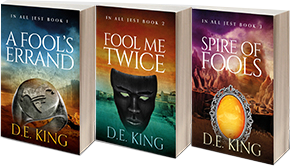Appearance
Who really were jesters and what did they look like? From ancient to Medieval times, the jester was always a brightly coloured figure.

Looking for Jester Clothing or Costumes to Buy?
Across the diverse types of jesters from the wandering fool to the court jester, the most iconic jester’s uniform consisted of motley clothes, jingle bells, and a fool’s hat or a monk’s cowl. However, not all jesters dressed alike.
For the poor jesters and jongleurs who moved from town to town and performed in taverns or fairs, they did not have the money to spend on elaborate outfits. From professional storytellers to acrobats, many jongleurs and fools were not as well off as the court jester, who in contrast was well taken care of. 1 As for the royal court jester, they wore the classic motley costumes and fool’s hats.
The personal jester did not always have freedom over their costumes. In Medieval society, the person who supported the jester, whether a king, queen, or even duke, had control over what the jester wore.
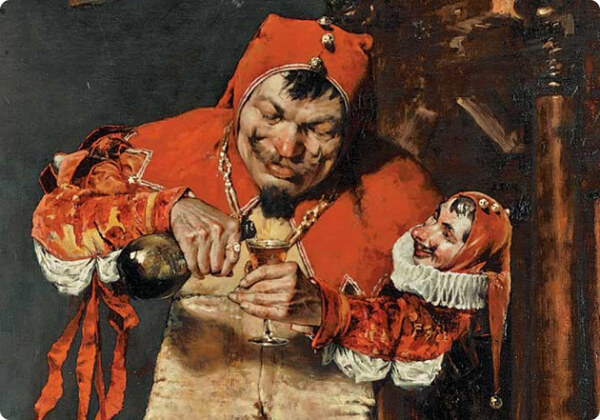
Keying Up – The Court Jester | William Merritt Chase (1875)
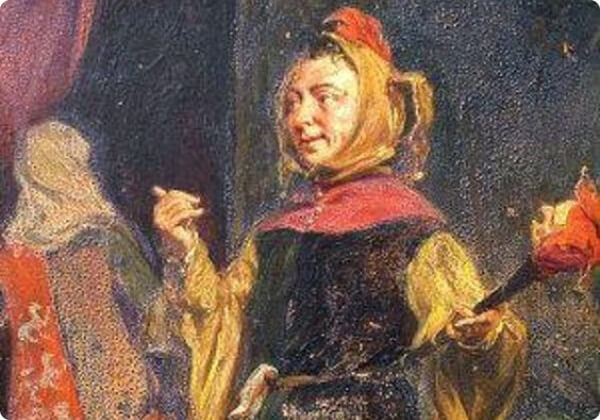
The Court Jester | Thomas Davidson (1877)
There were two types of jesters throughout the Middle Ages, the natural fool and the professional jesters or licensed fool. While both fools are recorded as being court jesters, they played vastly different roles.
The licensed or professional fool was a witty and notable figure of the court, often being keen ears and eyes for the reigning monarch and offering advice on state affairs. These figures were often dressed to better help their role of delivering bad news to a monarch with a punchline and having the ability to offend noble figures without repercussions. 2
The natural fool was a quite different role, these jesters were employed based on their physical appearance. Often these natural fools were deformed, had dwarfism, or even a hunchback. These physical traits would play into the role of the jokester and buffoon.
The jester was a master of skills, from juggling, dancing, singing, or even tumbling. As they were such a master of entertainment it was common for them to have several key props that they used in their routines. The most common and famous example is the jester’s sceptre. 3
While the sceptre wasn’t the only tool of the trade for the jesters, it would help create the iconic image of the jester that we see and remember today.
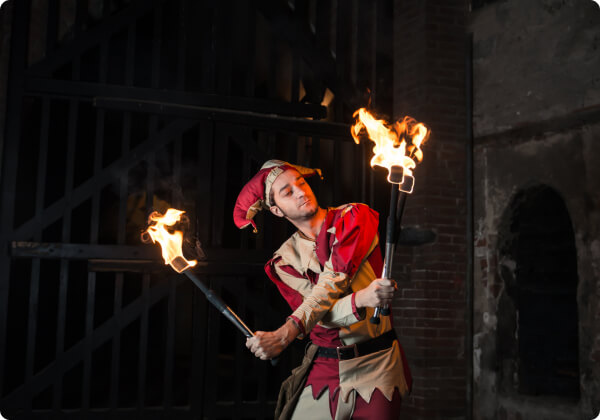
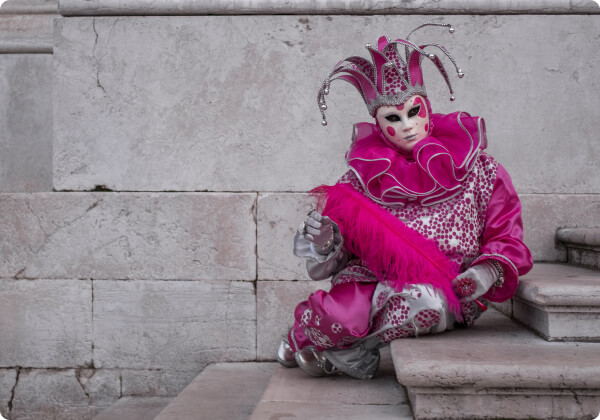
In today’s time you can find the modern jester around the world. The role of the jester has evolved over time and street performers, clowns, comedians, comic actors, and even some circus performers, all are rooted in the jester tradition 4. In modern times, the jesters’ costume can involve clown wigs, face paint, and of course brightly coloured clothes.
The wandering comics can also be seen at Medieval reenactment fairs, dressed in brightly coloured motley just like the European jester during the Medieval period.
Resources:
- The Editors of Encyclopaedia Britannica. (1998, July 20). Jongleur | Medieval, troubadours, minstrels. Encyclopedia Britannica. https://www.britannica.com/art/jongleur
- Perry, T. (2022, April 29). Court jesters in medieval England. Oxford Castle & Prison. https://www.oxfordcastleandprison.co.uk/about/news/court-jesters-in-medieval-england/
- Medieval Jesters. (n.d.). https://www.medieval-life-and-times.info/medieval-life/medieval-jesters.htm
- Official, L. K.-. T. (2021, September 6). Clowns – a Brief Look Into their History and Mythology – TheatreArtLife. TheatreArtLife. https://www.theatreartlife.com/circus/clowns-a-brief-look-into-their-history-and-mythology/#:~:text=Clowns%20are%20mentioned%20in%20the,different%20cultures%20around%20the%20world.

